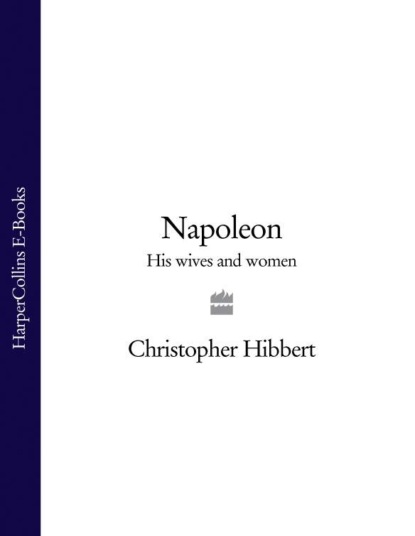По всем вопросам обращайтесь на: info@litportal.ru
(©) 2003-2025.
✖
Napoleon: His Wives and Women
Настройки чтения
Размер шрифта
Высота строк
Поля
‘Come to fetch me! Why? Where do you want to take me?’
‘To go to the Tuileries, of course. To deliver the invitation.’
‘My dear Junot, you are completely mad!’
‘But how are you going to get him to come otherwise?’
‘Well, really! How do you suppose? I shall send him an invitation like everyone else.’
Junot’s mouth fell open, as it often did when he was surprised, Laure continued her account. ‘He walked about in silence, looking in consternation at my mother…who with great gravity took a pinch of snuff.’
The following day, General Junot, Laure and Laure’s brother, Albert, went to the Tuileries where Napoleon greeted them ‘smiling good-naturedly’. ‘Oh!’ he said. ‘What does this family deputation mean? Only Madame Permon is missing. Do the Tuileries frighten her? Or do I?’
‘Madame Permon wanted to come with us,’ Junot replied. ‘But you know how ill she is and it was impossible for her to leave her room.’
When the invitation was proposed to him, he immediately accepted it, merely asking why they all looked as though they expected him to refuse it.
‘Oh! I quite understand Madame Permon is ill,’ he added. ‘But there is laziness, too, also something else that I don’t want to talk about. Isn’t that so, Madame Loulou?’
And then he pulled Laure’s ear; and, not troubling to control the impulse that so often overcame him, he pulled it so hard that the tears came into her eyes, as they did on another occasion when he pinched her nose so tightly that he made it bleed.
This was rough treatment to which his servants were often to be subjected. ‘I can confirm that he used to pinch not merely the tip but the whole of the ear, sometimes catching hold of both of them at once in quite purposeful fashion,’ one of his valets was to write. ‘Sometimes when I came in to dress him he would rush at me, crying, “Hello, you rascal!” and pinch both my ears at once so hard it made me scream. Quite often he also slapped my face several times, after which I was sure to find him good-tempered for the rest of the day.’
Not only servants but generals, women and children were all subjected to this treatment. General Junot’s ear was once pinched so hard that it bled, while ladies at court were reduced to tears. One of his nephews was also once reduced to tears by an exceptionally painful pinch and was then punched hard for making a fuss.
Having altered the proposed date for the dance at the Permons to an evening more convenient to himself, Napoleon arrived at the appointed time in his grey overcoat which he declined to take off even though the house was stiflingly hot. Mme Permon greeted him formally with ‘one of her most graceful curtseys’.
‘Madame Permon,’ he rebuked her, ‘is that the way you receive an old friend?’ and he held out his hand towards her. He was perfectly agreeable, though his hostess, while remaining polite, was far from friendly towards him. Her daughter, urging her to be more cordial, later persuaded her to go into the room where their guest had established himself.
‘He came straight up to my mother,’ Laure recalled and said to her ‘Eh bien, Madame Permon, what have you got to say to an old friend? It seems to me you forget them easily.’
She answered him in Italian: ‘I cannot forget, dear Napoleon, that you are the son of a friend, brother of my good Giuseppe, of dear Luciano, and of Pauletta.’
‘So then,’ Napoleon replied, ‘if I hold any place in your regard, I owe it to my mother, my brothers and sister.’
He then strode towards the fire while Mme Permon sat on a sofa opposite him, her foot shaking as it was inclined to do when she was annoyed and likely to lose her temper.
‘Really,’ she said, returning to the contentious matter of Napoleon’s prevarication in the granting of a commission to her cousin which had come between them at their previous meeting. ‘One may forget something after an interval of some years. Do you mean to tell me that it was difficult for you to remember, after a few days, something that may have affected a young man’s whole career?’
‘Ah, so that’s it,’ said Napoleon, walking up and down the room with his hands clasped behind his back. Then, overcoming his annoyance, he took one of Mme Permon’s hands as though to kiss it, observing as he pointed to her bitten fingernails, ‘It does seem that you don’t correct any of your faults.’
‘No,’ she said. ‘They and I have grown old together.’
It was now two o’clock. Napoleon sent for his carriage. Madame Permon asked him if he would not stay for supper. ‘Impossible,’ he said abruptly but as though with regret. ‘However, I will come to see you again.’ He never did.
8 PARISIAN SALONS (#ulink_9348a514-6f4b-5645-83a4-72dbe6626aee)
‘I am highly regarded here.
I have friends, pleasures and parties.’
AS A PROTÉGÉ OF BARRAS, Buonaparte who, in his own words, ‘knew no one else there’ was introduced into the salons of Mme Tallien, Mme de Staël, Mme Récamier and of several other hostesses in Paris. Such women, he told his brother Joseph, appeared to ‘hold the reins of government’, while the men ‘made fools of themselves over them’ and lived ‘only for them’. They were, he told Désirée Clary thoughtlessly, beautiful as the female characters in old romances and ‘as learned as scholars’. They were all, indeed, remarkable women.
Thérésia Tallien, wife of Jean-Lambert Tallien, one of the leaders of the Thermidorian reaction after the fall and death of Robespierre, a woman of outstanding beauty and wit, still presided over her salon at the Chaumière from which she would emerge in wigs of astonishingly unnatural colours to act as referee in games of bowls, clothed, so one witness testified, ‘à la Diane, her bosom half naked, sandals on her feet and dressed, if one can use the word, in a tunic above her knees’. Indeed, so Talleyrand was to say of her, Thérésia was usually ‘as expensively undressed as it is possible to be’.
Germaine de Staël, the wife of Baron Eric de Staël-Holstein – the Swedish Ambassador in Paris – and mistress of Louis, comte de Narbonne, held Thursday soirées at the Swedish embassy. She greatly admired the young Napoleon, calling him ‘Scipio and Tancred, uniting the simple virtues of the one with the brilliant deeds of the other’. It was considered characteristic of her irritatingly fulsome admiration of the general that once, on approaching a drawing-room door, she drew aside to let Colonel Lavalette precede her with the words, ‘How could I venture to walk in front of one of Buonaparte’s adjutants?’ But Napoleon felt no admiration for the woman in return, finding her exasperatingly pretentious and impertinent. She once burst in upon him when he was in his bath with the announcement: ‘Genius has no sex.’
Jeanne-Françoise-Julie-Adelaide Récamier, the alluring eighteen-year-old, white-clothed, virginal wife of an extremely rich and elderly banker, an enticing, narcissistic girl who was to give her name to the day bed upon which she so elegantly reclined, held sway in a salon as vivacious as any of her rivals.
Among these rivals was Fortunée Hamelin, a sprightly, amusing young woman of about the same age who, despite an appearance rather too plain to be pronounced jolie laide, attracted a succession of lovers, including the high-spirited adventurer, Casimir de Montrond, whom, so she claimed outrageously, she had discovered in a lascivious embrace with Mme Récamier. Mme Hamelin herself was far from averse to such embraces and her appearance in a ballroom, heralded by the heaviest and most liberally applied of scents, was sure to be welcomed by numerous would-be partners eager to be clasped against her inviting breasts. Another of Mme Récamier’s rivals was Aimée de Coigny who had been married at fifteen to the duc de Fleury and then to Casimir de Montrond, who had hoped to get his hands on sufficient money to pay his ever-mounting debts and who, while imprisoned with Aimée at St Lazare, contrived to have their names removed every day from the lists of those submitted to the Revolutionary Tribunal by offering extravagant rewards, which he was in no position to pay, to the official whose duty it was to compile them.
In this Thermidorian Paris where women held such sway, Napoleon Bonaparte, as he soon chose to spell his name as appearing less Italian, cut a poor figure. As though in deliberate provocation of his fellow guests in their high fashions and fastidious toilets, he would appear with his hair dirty and uncombed, his face scarred with scabies contracted at Toulon, his body evidently unwashed, and his French as yet so imperfect that other guests sometimes could not, or affected not to, understand him.
At La Chaumière, he was, according to the banker, Gabriel Ouvrard, the least impressive of all the men there. He was at an exceptionally low ebb, once more contemplating suicide. There was only one thing to do in this world, he decided, and that was to acquire money as Paris’s nouveaux riches speculators were contriving to do; and, having acquired money, to get ‘more and more power’. Joseph had money now through his family connections, and Napoleon advised his brother how to invest it; though he himself had neither money nor power. Nor did he attract women. His friend, Andoche Junot, later recalled how, during their rambles around Paris, Napoleon would speak angrily of the jeunesse dorée, the Muscadins, who enjoyed ‘all the luck’ with women, and how, when he saw them promenading in front of him as he and Junot sat in an open-air café, he would petulantly kick the chair in front of him. He was unlucky in love, he declared mournfully, referring, so some thought, to Mme Tallien who rejected a proposal he made to her with what the young banker Gabriel Ouvrard described as ‘an incredulous laugh’.
But then his career took a more hopeful turn. Obtaining the requisite medical report, he applied for sick leave so that he would be free to accept a more promising appointment than that of the command of the Army of the West should an alternative be offered him. This caused temporary difficulties: the Committee of Public Safety ruled that the doctor who had supplied the certificate was not qualified to do so and that Bonaparte was to be relieved of his command for insubordination in disobeying orders.
Napoleon turned for help to Barras, who did not disappoint him: he was soon offered an important appointment in an influential department of the Committee of Public Safety in Paris, a useful stepping-stone to the power he craved. ‘If I could be happy far from you, I would be now,’ he wrote to Désirée in an affectionate letter reflecting his sudden change of mood. ‘I am highly regarded here. I have friends, pleasures and parties…I kiss you a million times and am your loving friend for life.’ A new-found friend he did not mention was Paul Barras’s maîtresse en titre, Marie-Josèphe-Rose de Beauharnais, vicomte de Beauharnais’s Creole widow, whom he was to call Josephine.
9 ADVENTURES IN ITALY (#ulink_81b93289-304a-5fd0-9203-3ede9fb144c2)
‘He absolutely worships me. I think he will go mad.’
NOT LONG AFTER that ‘whiff of grapeshot’ on 5 October 1795 had helped to defeat the supporters of a counter-revolution and had secured his future, Bonaparte received a letter from Josephine de Beauharnais who assured him of her fond attachment to him, gently reprimanding him for neglecting her, and inviting him to lunch on the following day. ‘Good night,’ she ended her letter, ‘mon ami, je vous embrasse.’
Napoleon answered the letter immediately, begging her to believe that it was only his pressing duties which kept him away from her, that no one desired her friendship as much as he did.
He had often seen this alluring widow at Mme Tallien’s house, La Chaumière, at Barras’s house and at her small neo-Greek pavillon at No 6 rue de Chantereine, the rent of which, so it was widely supposed, as well as the wages of her gatekeeper, her coachman, her groom, her gardener, her chef and her four domestic servants, was paid by her lover, Paul Barras.
She herself gave the impression of being rich, in possession of extensive estates in the West Indies; and this was at least one of her attractions in the eyes of Napoleon who, before becoming too deeply involved with her, went to see her notary to make enquiries about this rumoured wealth – an indiscretion which naturally much annoyed Josephine when she heard about it.
But there was far more to her than her supposed riches. Although six years older than Napoleon and described by the disaffected as ‘decaying’, as sunk in ‘early decrepitude’, by no means clever or witty like her young and intimate friend, Thérésia Tallien, she was still a most attractive woman: elegant, beautifully dressed, simpatica, voluptuous, languorous, speaking softly in her pleasing voice with its attractive Caribbean inflexion. She had bad teeth; but she had learned to smile without showing them. Napoleon, as he himself admitted, was gauche and shy with women, professing a defensive contempt for them as not to be regarded as men’s equals, as ‘mere machines for making children’. Yet with Josephine he felt at ease: she gave him confidence; she flattered him, paid him, as he said, ‘all manner of compliments’. Besides, she was, so he believed, not only rich but a great lady of the ancien régime. He soon conceived thoughts of marrying her: she would – as Barras said, advising him to do so – help people to forget his Corsican name and make him ‘entirely French’.
She herself regarded a possible marriage to this young and rather uncouth general with misgiving. He was undeniably ‘passionate and lively’ yet still ‘awkward and altogether strange in all his person’, though admittedly not so unprepossessing as he had been in the recent past: he now brushed his hair properly and splashed himself liberally with eau de Cologne, and his features were occasionally transformed by a remarkably attractive smile. But, despite his undoubted promise, his future was far from secure, as hers might well be also if she married him. She was evidently concerned that, if she became Bonaparte’s wife, she might lose the protection of Barras who had already taken Thérésia Tallien as a supplementary mistress. Moreover, neither his family nor hers was in favour of such a match; nor was her notary, Raguideau, who told her she would do much better marrying an army contractor who would have the means to make her rich. Others proposed Gabriel Ouvrard.
Once he had decided that marriage to Josephine de Beauharnais might well promote his career, Bonaparte for his part had no doubt that he should make her his wife. Having come to that decision, he fell in love with her. After what was evidently their first night together, he wrote to tell his ‘sweet and incomparable Josephine’ that he drew from her lips and heart a flame that consumed him. He sent her ‘a thousand kisses’; and asked her not to send him any in return for they burned his blood. Less romantically, and much later, he told comte Bertrand, ‘I really loved Josephine, but I had no respect for her. She had the prettiest little cunt in the world…Actually I married her only because I believed her to be rich. She said she was, but it wasn’t true.’
It was not until the end of February 1796 that Josephine’s reluctance was at length overcome and she agreed to marry Napoleon, telling Grace Dalrymple Elliott that she did not really love him but that she thought he could be of service to her children. He had already written to Désirée, telling her that unless she could obtain her parents’ consent to an immediate marriage – consent which, as a minor, it was essential for her to obtain and which he presumed she would not get – he would be compelled to end their relationship. Her answer was contained in a sad little letter, wishing him well and assuring him that she could never love anyone else. He had destroyed her life, she told him, but she was ‘weak enough’ to forgive him. ‘May the woman you have chosen make you as happy as you deserve to be. In the midst of your present happiness do not forget poor Eugénie, and be sorry for her fate.’
Marriage to Josephine de Beauharnais, a civil ceremony, took place on 9 March. For a variety of reasons it was, in fact, invalid: the official who conducted the service was not legally qualified to do so; the young officer who witnessed Napoleon’s signature was a minor and, therefore, equally unqualified for this duty; Josephine, claiming that she could not do so because of the British occupation of the Windward Islands, failed to produce her birth certificate and took the opportunity of reducing her age by four years; while Napoleon, also claiming to be unable to produce his own birth certificate, gave his date of birth as Joseph’s and place of birth as Paris rather than Ajaccio.
The bride, wearing a white muslin gown with a tricolour sash and an enamelled medallion engraved with the words ‘To Destiny’ – a present from the bridegroom – waited for the appearance of Napoleon, with the Talliens, Paul Barras and her notary sitting by her side. They waited in the cold room by the light of a tin lantern for an hour, then two hours, then three before Napoleon burst into the room, shook the sleepy official by the shoulder, told him to get on with it, and, within a few minutes, was driving back with his wife to her house.
Four days before, to the annoyance of more senior officers and particularly of Lazare Hoche, under whom he had declined to serve in Vendée, Napoleon had been appointed commander of the Army of Italy, an appointment described maliciously as ‘Barras’s dowry’; and, two days after the wedding, he left Paris for the Army’s headquarters in Nice. Here he encountered the major-generals who were, with varying degrees of reluctance, to serve under him: Louis Desaix, Pierre Augereau and André Masséna. They were all tall men, powerfully built, towering over Napoleon whom Masséna later described as ‘puny and sickly looking’, a man who had got his command through the influence of Barras and Barras’s women.
Within weeks, their opinion of the pale little Corsican had been transformed. Napoleon found the army under strength, badly equipped and poorly paid. In one of those inspirational addresses which were to exhilarate his soldiers in campaign after campaign, he is said to have promised to lead them into the ‘most fertile plains in the world’, through rich provinces and great cities where they would find ‘honour, glory and riches’. True to his word, he succeeded in splitting the forces of the Austrian Emperor and of the King of Sardinia which outnumbered him. He won a succession of astonishing victories, news of which were sent to the government in Paris, the Directory, by relays of couriers galloping across the plains of Lombardy.
These couriers also took with them not only trophies of victory–flags and standards – but a series of scribbled letters addressed to 6 rue Chantereine for Mme de Beauharnais who had not, as yet, adopted her husband’s name. He wrote every day, sometimes twice a day, his pockets stuffed with unfinished, scarcely coherent letters never sent to his ‘adorable Josephine’, his ‘sweet love’, the ‘pleasure and torment of his life’. Not a day went by, he told her, without his loving her, not a night without his longing to hold her in his arms. He loved her more each day; he longed to kiss her heart and then lower on her body, much, much lower, underlining the words with such force that the point of his pen struck through the paper. ‘Never has a woman been loved with more devotion, fire and tenderness,’ he told her. If she were to leave him he would feel that, in losing her and her ‘adorable person’, he would have lost everything that made life worthwhile.









